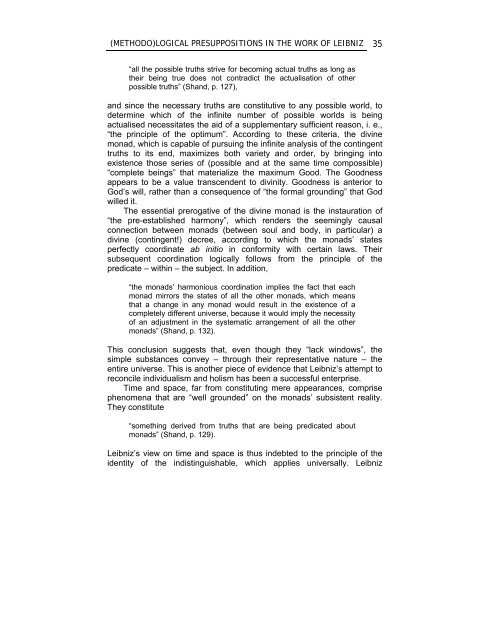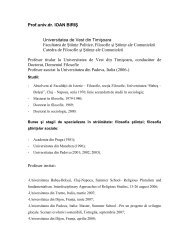analele universităţii de vest din timişoara annales universitatis ...
analele universităţii de vest din timişoara annales universitatis ...
analele universităţii de vest din timişoara annales universitatis ...
Create successful ePaper yourself
Turn your PDF publications into a flip-book with our unique Google optimized e-Paper software.
(METHODO)LOGICAL PRESUPPOSITIONS IN THE WORK OF LEIBNIZ 35<br />
“all the possible truths strive for becoming actual truths as long as<br />
their being true does not contradict the actualisation of other<br />
possible truths” (Shand, p. 127),<br />
and since the necessary truths are constitutive to any possible world, to<br />
<strong>de</strong>termine which of the infinite number of possible worlds is being<br />
actualised necessitates the aid of a supplementary sufficient reason, i. e.,<br />
“the principle of the optimum”. Accor<strong>din</strong>g to these criteria, the divine<br />
monad, which is capable of pursuing the infinite analysis of the contingent<br />
truths to its end, maximizes both variety and or<strong>de</strong>r, by bringing into<br />
existence those series of (possible and at the same time compossible)<br />
“complete beings” that materialize the maximum Good. The Goodness<br />
appears to be a value transcen<strong>de</strong>nt to divinity. Goodness is anterior to<br />
God’s will, rather than a consequence of “the formal groun<strong>din</strong>g” that God<br />
willed it.<br />
The essential prerogative of the divine monad is the instauration of<br />
“the pre-established harmony”, which ren<strong>de</strong>rs the seemingly causal<br />
connection between monads (between soul and body, in particular) a<br />
divine (contingent!) <strong>de</strong>cree, accor<strong>din</strong>g to which the monads’ states<br />
perfectly coor<strong>din</strong>ate ab initio in conformity with certain laws. Their<br />
subsequent coor<strong>din</strong>ation logically follows from the principle of the<br />
predicate – within – the subject. In addition,<br />
“the monads’ harmonious coor<strong>din</strong>ation implies the fact that each<br />
monad mirrors the states of all the other monads, which means<br />
that a change in any monad would result in the existence of a<br />
completely different universe, because it would imply the necessity<br />
of an adjustment in the systematic arrangement of all the other<br />
monads” (Shand, p. 132).<br />
This conclusion suggests that, even though they “lack windows”, the<br />
simple substances convey – through their representative nature – the<br />
entire universe. This is another piece of evi<strong>de</strong>nce that Leibniz’s attempt to<br />
reconcile individualism and holism has been a successful enterprise.<br />
Time and space, far from constituting mere appearances, comprise<br />
phenomena that are “well groun<strong>de</strong>d” on the monads’ subsistent reality.<br />
They constitute<br />
“something <strong>de</strong>rived from truths that are being predicated about<br />
monads” (Shand, p. 129).<br />
Leibniz’s view on time and space is thus in<strong>de</strong>bted to the principle of the<br />
i<strong>de</strong>ntity of the indistinguishable, which applies universally. Leibniz




